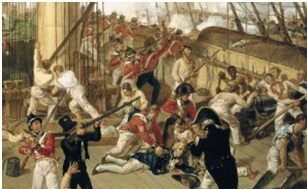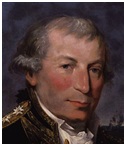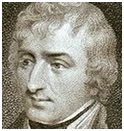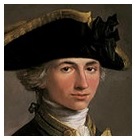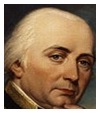|
 |
|
 |
Horatio Nelson Leadership
Horatio Nelson (1758-1805)
The greatest naval leader in British history (pictured right). His decisive victories at the Battle of the Nile (1798), and at Trafalgar (1805) , in his ship, the Victory, saved Britain from a French invasion. Also famous for his passionate, extramarital affair with Emma (Lady) Hamilton. Nelson was well liked, even by her husband (all three lived happily together!).
For more detail see... The Battle of Trafalgar in the History Highlights section.
Why was he a great leader?
1. Kind but tough His men loved him dearly (they cried when he died), because he was
At the Battle of the Nile he refused to be treated before the other injured men. When he was dying at the Battle of Trafalgar, he covered his face and medals with a handkerchief so that his men wouldn’t see he had been hit (pictured right). But he was also a
He knew the value of speed, saying: “Five minutes make the difference between victory and defeat”.
2. Empowerment and trust He clearly communicated his broad battle plan and its purpose, giving his men total freedom to carry it out. When he signalled to the fleet before the Battle of Trafalgar, “England expects that every man will do his duty”, everybody knew what they had to do, because of this close attention to detail. Nelson:
3. Learning and reflection He was not intellectually brilliant, but he thought deeply about his battles (including his mistakes) and learned from them. He also learned the value of professionalism and discipline from his former bosses, Admirals John Jervis (pictured right) and Samuel Hood (pictured right below).
4. Rebellious revolutionary He rejected the old tactic of bombardment between two parallel lines of ships in favour of directly and quickly attacking the enemy’s commander-in-chief, as at the Battle of Trafalgar. He was never made a full admiral because his bosses hated his rebellious disobedience (what he called the “Nelson Touch”). At the Battle of Copenhagen (1801), he ignored an order to stop fighting by famously turning his telescope to his blind eye. At the Battle of the Nile he broke the rules by attacking after dark in uncharted waters. He was a brilliant opportunist who had the ability to discover and exploit any advantages.
5. Leading by example Nelson always led the attack, without caution or hesitation, for death or glory. His legendary bravery was shown by his famous wounds, a missing arm and a blind eye. “I will be a hero”, and “I will brave every danger”, he said at the age of 18. His supreme self-confidence, and calmness under bombardment, rubbed off on his men. 6. The will to win His ambition to be a hero came from an insecure childhood, his mother dying when he was nine. He joined the Navy aged 12, and his determination to succeed made him the Navy’s youngest captain at 20 (pictured right aged 23). He was always optimistic and never wasted time.
7. Vision, purpose and duty He had the clear aim of destroying the enemy to
He also had deep sense of duty to serve:
His father was a Church of England priest, and he was always deeply religious. His last words were “Thank God I have done my duty” (not “Kiss me Hardy” as is sometimes thought, see point 8).
8. Teamwork and support He worked incredibly well with his senior officers. At the Battle of Trafalgar his famous remark on his deathbed, “Kiss me Hardy”, shows how well he got on with them. He was helped by: a) the superiority of British guns which (unlike the French) could withstand rapid fire. b) well trained, inspired and disciplined men who could fire their guns much quicker than the enemy. c) brilliant deputies like Admiral Collingwood (pictured right above). d) Lady Hamilton’s love (pictured right below in 1782).
Key quotes on leadership and management Desperate affairs require desperate measures. I could not tread these perilous paths in safety, if I did not keep a saving sense of humour. When the enemy is committed to a mistake we must not interrupt him too soon. You cannot be a good officer without being a gentleman.
Key quote on ethics May humanity after victory be the predominant feature of the British fleet (said before the Battle of Trafalgar) England expects that every man will do his duty.
Key quote on death Life with disgrace is dreadful. A glorious death is to be envied.
Key quote on strategy Engage the enemy more closely (Nelson's favourite battle signal).
|
|
|
||
|
|
|
||
|
||
| Copyright © wisdomtowin.com All Rights Reserved | ||
|


